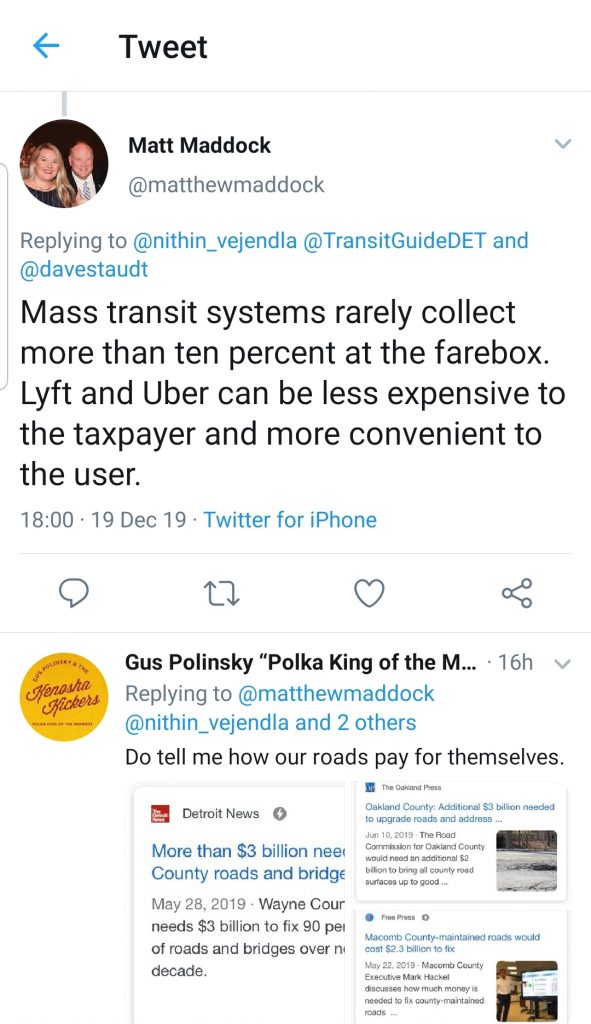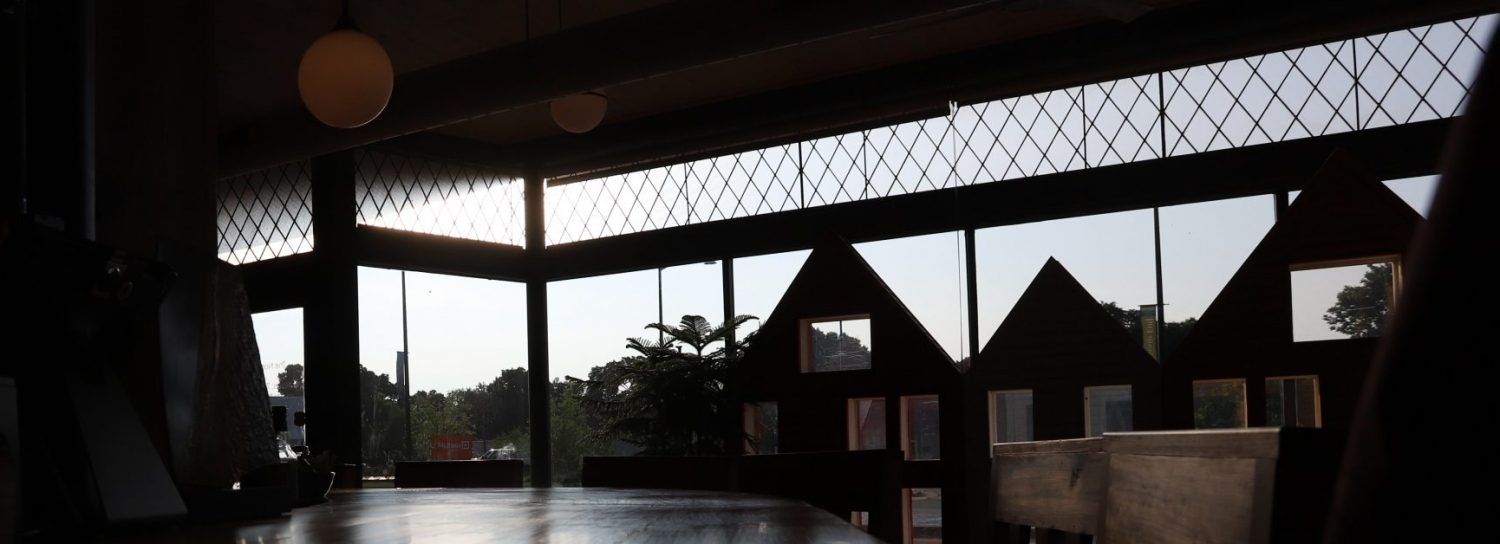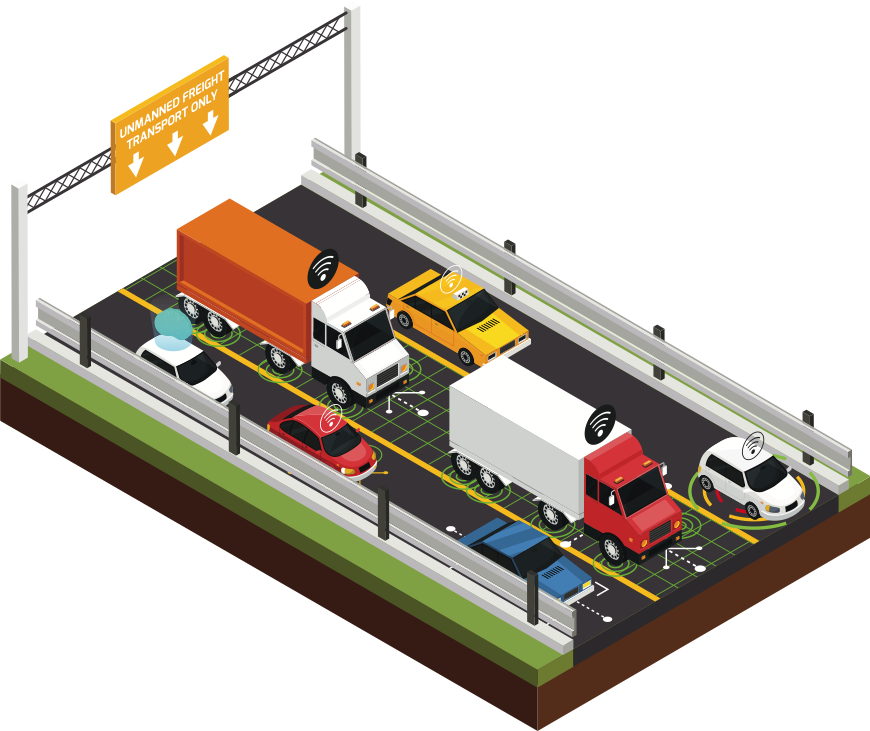State Lawmaker Asks, “Why Can’t People Just Take Uber Instead?” Let’s Explain Why.
There are a few names that often get thrown around in Southeast Michigan when one discusses the fight for infrastructure. The late Oakland County Executive L. Brooks Patterson, for example, was a staunch opponent of transit expansion. Many longtime observers gave him a break for his casual racism and profanity. He even went so far as to talk about how much he loved sprawl in a now-notorious interview with the New Yorker in 2014. Mark Hackel in Macomb has made a point to emphasize how fixed-route transit is an “obsolete” technology. When I interviewed his deputy in 2018, John Paul “JP” Rea, Rea claimed that Hackel hadn’t said that. (Narrator voice: He did). Notable advocates include the likes of Warren-based Dave Gifford or a plethora of activists and advocates in the city proper.
Less-known detractors include legislators from farther-flung districts.
Republican Matt Maddock is one such contributor. Maddock, representing Michigan’s 44th District who owns a bail bond company, took a recent opportunity on Twitter to rail, no pun intended, against transit. Dave Giffords (Transit Guide) had tweeted about the need for more frequent, reliable service so people don’t have to wait endlessly in the cold.
Bus service in Macomb, where County Executive Mark Hackel recently claimed on Stephen Henderson’s WDET show, not a single voter would say there is a need for transit expansion, is infrequent at best.
“Exactly why we don’t need more archaic busses [sic],” Maddock wrote. “Busses [sic] and bus stops are cold, wet and smelly. Waiting for busses stinks… bussing is just mean.” Bussing is just mean? Mean to whom, sir?
On Facebook, I might have responded with the group tag, “Those are all certainly words.” Bus stops are cold and wet in the same way that, well, streets are cold and wet, when it’s cold and wet. Outside. You know? In this case, I’m not really sure why a legislator involved in transportation appropriations is publicly talking about how awful public transit is.
He then goes on to quote Randall O’Toole, a notorious anti-transit pedant of the Koch-funded Cato Institute. I responded that quoting Randall O’Toole, who has a fraught relationship with reliable research, to back your anti-transit points, was kind of like quoting anti-gun control pundit John Lott, whose seminal, dubiously-researched magnum opus, “More Guns, Less Crime,” is the Holy Grail of anti-gun control talking points.
Lott and O’Toole both purport to be impartial observers in pursuit of a virtuous truth, of course. But their flawed research methodologies and financial backing by vitriolic political interests suggest that their objectives may be as clouded as their research conclusions.
Maddock again toed the line of the virtuous alternatives of TNC’s like Uber and Lyft. Claiming that “mass transit systems rarely collect more than 10% [of costs] at the farebox,” he asked, in effect, why taxpayers should foot the bill for a mostly-empty bus that costs $80 an hour to operate, the logic goes, instead of the unwashed masses just paying their own fares with Lyft or Uber?
Well. There’s a lot to unpack here!
Leaving aside issues of equity or the importance of having, well, a civil society where people other than the well-paid can get around, we look at Gus Polinsky’s response below. Southeast Michigan has billions of dollars in deferred road maintenance and repairs. The state and federal government are already deep into a multibillion dollar “modernization” project for I-94 and I-75 that will take decades. These projects are not recouping their costs. They are never intended to recoup their costs. Yet they’re treated as sort of an inevitability. Michigan’s beet-red legislature fought tooth-and-nail against a gas tax hike.
They would inevitably fight against tolling these roads.
What is the current “farebox recovery ratio” equivalent of Michigan roads? Hard to say. We have a low gas tax that is unable to fund maintenance. We have a low federal gas tax. Auto registration fees are a drop in the bucket in comparison to multibillion dollar widenings that no one wants. I wouldn’t be a bit surprised if the road equivalent of FRR were under 10%, though.
Yet many lawmakers insist that highway spending is just an inevitable cost. It empowers American freedom and independence, they will say. Cars are liberty machines that allow you to go where you want, when you want! Rideshare will allow more flexibility at lower cost! You could buy every rider a Tesla for the cost of providing public transit! (Really, they’ve tried to argue this).
Never mind that TNC’s actually create a ton of congestion. They face continual allegations of tax evasion from misclassifying workers.
Importantly, though, going back to Maddock’s point about money, TNC’s are not even profitable. Similar to how Donald Trump has allegedly kept two sets of books— one to show to prospective investors or lenders and one to show for tax purposes- Uber has made arguments about how profitable their rides are while enjoying the tax writeoffs from massive losses.
It’s a little bit more complicated than simply profit or loss. Uber makes a huge amount of money on each ride at a “marginal” rate. This means that it only is incurring pennies in immediate costs per additional ride. But it has a massive overhead. It employs thousands of engineers, lawyers, and designers. In MBA-speak, we look at this chasm between “variable costs” and “fixed costs” as utterly important in building an enterprise. If your variable costs are virtually nothing, you should be able to become profitable through scale. If you’re already way the heck scaled up, enjoying low variable costs, and still can’t make a profit, you might just be running a bad business. Apple sells songs for $1.29 each and nets more than $1.28 of that. But every iTunes or App Store build has to be updated with new code every day or two. Tim Cook has to get paid. Et cetera.
Back to the question of why people can’t just take Uber, though. Cost-wise, you’re either subsidizing lower-income riders or you’re demanding that they pay their own way. $55 a month for an unlimited transit pass works out to 44 one-way trips each month at a rate of $1.25 per trip. It’d take a very high rate of transit ridership to hit a 100% farebox recovery ratio. But I imagine that some routes come close– like the Woodward Bus. In contrast, Uber or Lyft rides cost more like $12-20 per. Maddock wants people to spend literally ten times more. We don’t even need to go down the rabbit hole to explore how much congestion or other externalities cost the average citizen per year. But TNC’s just ain’t it.
Anyway, this is all to say that people like Maddock are not considering the complex ecosystem of transportation when they fire off tweets like these’uns. Judging by the rest of Maddock’s Twitter– he loves Donald Trump, who has his own dubious relationship with the truth- he might not actually be that interested in facts.
He’s certainly not interested in efficiency if he’s interested in promoting roads, roads, roads, and not interested in exploring alternatives– viz. fixed routes. You know, things that could reduce congestion. Things that could empower Michiganders with more money in their pockets. Like the $400 many Detroiters are paying for monthly car insurance policies. Imagine what that money could do for the state’s stagnant economy.
Still, I’m not sure when we got to the point where people could honestly parrot the idea that they were “sitting in gridlock in a gas-guzzling truck to own the libs.” But it’s really got to stop if we’re going to move forward as a prosperous society.
It’s certainly going to have to stop if Michigan is ever going to emerge from its decades of economic doldrums and fix its infrastructure. If the electorate demands improved transit in 2020, it will be interesting to see whether these lawmakers change their tune.
(I reached out to the offices of Representatives Jack O’Malley and Matt Maddock, respectively chairmen of the Transportation Committee and the Transportation Appropriations Committee, but had not received a response as of the time of publication.)




